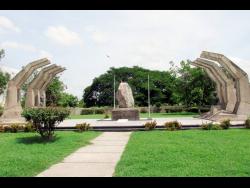
The Jamaican Government’s mega project to relocate the parliament building to National Heroes Park and transform surrounding communities has received lukewarm support from businesses and residents, with 40 per cent of respondents saying they prefer an alternate use of the space.
Overall, however, six out of 10 residents and businesses favour the project.
Residents mostly prefer the expansion and resuscitation of the green space into a park similar to the Emancipation Park in New Kingston, while businesses want a sports complex, harking back to its original usage. The survey results, published in the environmental impact assessment, EIA, report submitted to planning regulators, downplayed the negative feedback in the report, alleging lack of knowledge.
“This somewhat muted ‘middle of the road’ response to the project across business respondents can likely be explained by the widespread lack of informed knowledge about the project,” stated the findings.
The proposed timeline for construction of the new parliamentary square is May 2021 to March 2023, according to the EIA published in mid-October. It’s a slight setback from the initial first-quarter 2021 start that reportedly had been set for the project.
The bidding process for construction started in July, with the winning bidders set for announcement next April, according to the EIA, which was prepared by Environmental Solutions Limited on behalf of Design Collaborative Limited.
Design Collaborative, a team of architects led by Evan Williams, won the design bid for the parliament project with their submission ‘Out of Many, One People’ in March 2019.
The first phase of the project involves the relocation of Jamaica’s Houses of Parliament, currently located at Duke Street in Kingston, to a new building on seven of the 50 acres designated as National Heroes Park. The remaining space will be transformed into green areas.
The second phase of the project, for which no timeline was stated in the EIA, involves renovations outside the boundaries of National Heroes Park, which would result in the relocation of government ministries around the circular boundary of the park and renovating the surrounding communities into a modern city.
The ministries operating in the area known as National Heroes Circle include finance, labour and education.
The idea of relocating the Houses of Parliament to solve the problem of needed parliamentary office space has been under consideration since the 1950s, with National Heroes Park as a preferred location, according to the EIA report.
Traffic, other concerns
Both residents and businesses are concerned that the project will lead to traffic congestion, restricted access to the area, and a reduction of the historical importance of the area. The Urban Development Corporation, the state body overseeing the implementation of the project, said in January that residents would still have access to the park and that the project should redound to the benefit of the community.
The EIA did not disclose the cost of the project, presumably due to the ongoing bidding process.
Some 362 residents and businesses in the surrounding communities were canvassed during the survey. It found that, overall, 62 per cent of residents and 64 per cent of businesses approved of the project. The others either did not approve or had no views one way or the other.
Those that approved of the project felt it was largely necessary.
In terms of an alternative use of the space, residents, at 18.8 per cent, felt the authorities should expand the green space, 11.6 per cent preferred the construction of a vocational centre, 10.5 per cent preferred housing, and 7.7 per cent preferred a business centre.
Naysaying businesses, on the other hand, preferred either a sporting complex, 21 per cent; green space, 18 per cent; fire services, 16 per cent; or vocational centre, 14 per cent.
The National Heroes Circle property was purchased in 1818 by the Kingston Council for some £985. At the time, it was part of a property called Montgomery Pen. The land became known as Kingston Race Course and for a century held the nation’s horse racing events, as well as hosted cricket and cycling events.
In 1953, the track was converted to a public park and renamed George VI Memorial Park. It was renamed National Heroes Park two decades later, in 1973, and serves as the official place of honour for Jamaican heroes and dignitaries.








